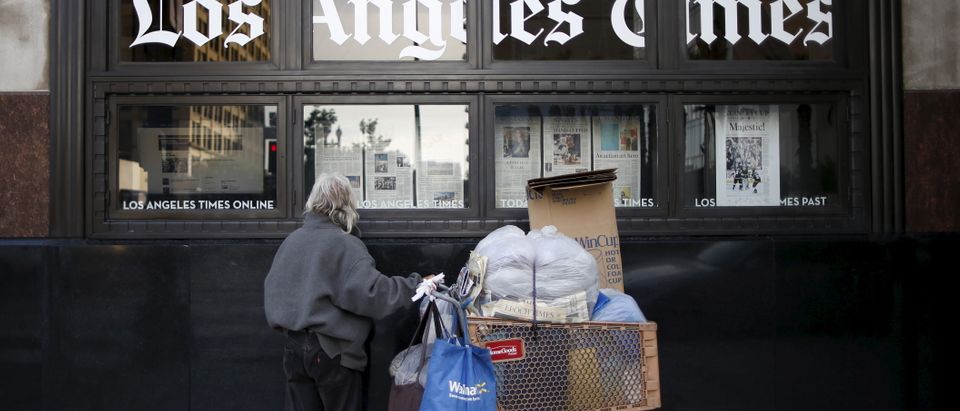If one wants to witness the despair and dangers of America’s massive opioid crisis, one should look no further than the homeless encampments growing in cities like Los Angeles, Seattle and Philadelphia.
Driven by a seemingly endless supply of new addicts making the transition from overprescribed painkillers, a surge in the addicted and newly homeless are flowing into cities that have publicized policies to not “criminalize” homelessness or addiction.
The encampments, reminiscent of the “Hoovervilles” that occupied parks and railroad beds during the Great Depression, are hot-spots for crimes like rape, assault, theft and open-air drug sales in the communities they’re settling in.
If you reside in an area where these encampments exist as I do, you can’t ignore the humanity of those who clearly need help to overcome their addictions. Instead of providing meaningful solutions to this tragic issue, however, local officials are enacting policies that enable increasing rates of crime, infectious diseases and a sharp rise in opioid overdoses in these encampments.
This is due to elected officials ordering a minimal law enforcement presence at these encampments. This isn’t due to a lack of caring or professionalism on the part of police but directives from mayors, district attorneys and/or city council, which, in an attempt to “not criminalize addiction,” have allowed these encampments to exist in nearly an enforcement-free environment.
As a result, these cities are becoming destinations for homeless addicts, and the citizens of these communities are bearing the brunt of their elected officials’ decision to limit law enforcement intervention. This issue is making national news as it affects million-dollar homeowners in Los Angeles, Fort Lauderdale and Seattle.
Residents of Philadelphia’s blue-collar River Wards, who have had property taxes nearly quadrupled in the last decade, are too increasingly feeling abandoned by a city who seemingly turns a blind eye to a steady barrage of addicts roaming the streets with stolen shopping carts (a pretty visible probable cause for a police stop).
It is in the Port Richmond neighborhood of Philadelphia’s River Wards where citizens packed the Mother of Divine Grace church on a humid Wednesday night to finally have the chance to meet with officials about this issue. Many of the same citizens belong to community organizations that regularly ask local police for help and are told by police commanders that those sworn to protect them have been instructed not to enforce the narcotics or quality of life violations needed to keep their neighborhoods free of these encampments.
Instead, the city sent Dr. David T. Jones, Commissioner of the Philadelphia Department of Behavioral Health and Intellectual Disability Services and other social service staff to discuss initiatives serving those living in the encampments with these taxpayers, who called the meeting for protection from these encampments.
Dr. Jones highlighted the city’s talking points of “safe injection sites” and “needle exchanges,” which focus on the safety and health of the addicts instead of meeting residents’ concerns how the city is going to and stop making their communities the destination for suburban addicts to seek inexpensive heroin or worse, deadly fentanyl.
To make matters worse, city representatives were incorrect about the basics of their own programs, like the locations of the encampments and the numbers of needles exchanged.
Addiction is a disease, and diseases are treated by conferring with experts. The term “enabling” comes from 12-step programs and is related to well-meaning people who contribute to the addict’s disease by making it easier for them to continue to abuse substances. It is arguable that the encampments are becoming out of control, not just because of increasing addiction rates, but because enforcement has become a “dirty word” for local political leaders in the cities hit hardest by this crisis.
In Philadelphia, politicians like District Attorney Larry Krasner and Mayor Jim Kenney, are conflating the issues of homelessness and addiction with the rampant crime and public health risks associated with hundreds of addicts living on the streets. Their instructing law enforcement to adopt a “hands-off” policy toward the open-air drug trafficking & use, assault and theft rampant in these areas has a chilling effect on the community, resulting in taxpayers being cheated out of the most vital public service promised to them.
No matter where you are in America, if you call the police, it’s a reasonable expectation that they’ll respond and enforce the law where necessary.
To effectively address this issue, politicians should empower police to enforce the law the areas hit hard by the opioid crisis.
In these communities, police may be the only mechanism to intervene and get addicts help when they turn to criminal behavior. What should change is how addicts are sentenced after arrest to create correctional treatment alternatives for addicts. Long-term residential treatment facilities where addicts go from detox to a program where they work, pay rent and maintain sobriety should be explored as sentencing alternatives vs. prison.
To accomplish this, politicians should stop funding ways to enable an environment where addicts can stay on the streets and continue abusing drugs; and start empowering programs that allow police to intervene and direct addicts into treatment.
Benjamin Mannes is a subject matter expert in public safety and is a board member for InfraGard and the Peirce College Criminal Justice Studies Advisory Board in Philadelphia.
The views and opinions expressed in this commentary are those of the author and do not reflect the official position of The Daily Caller.


